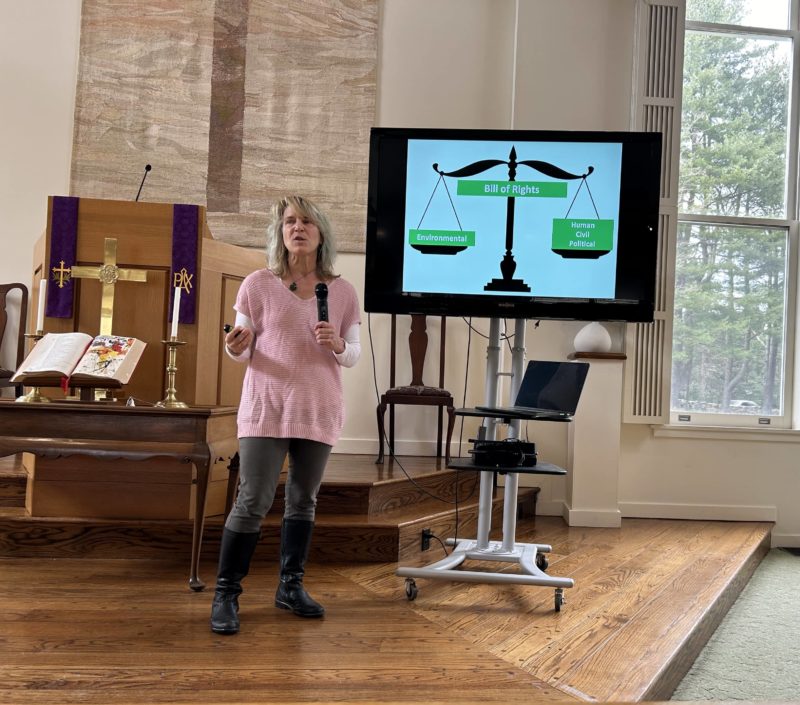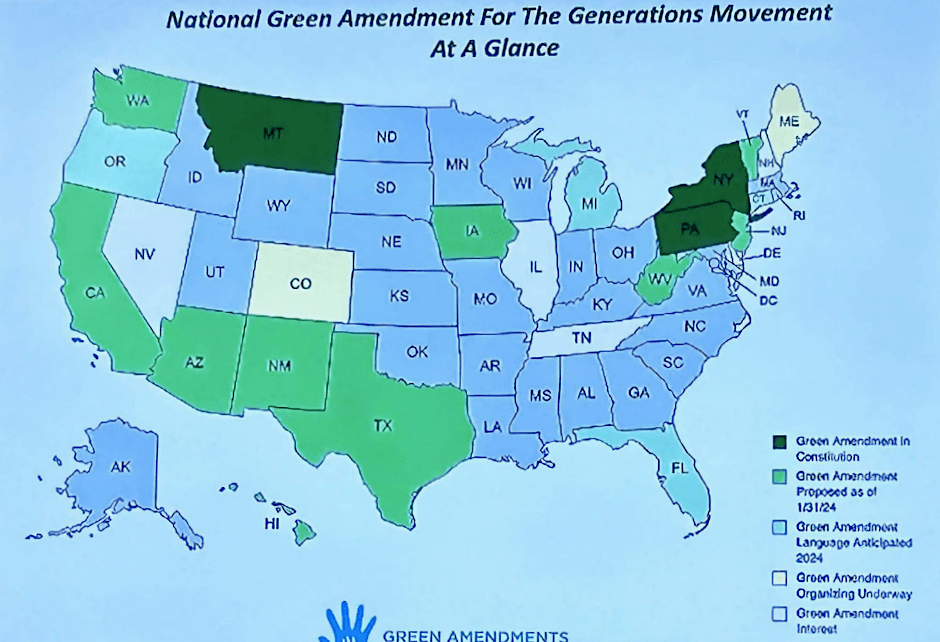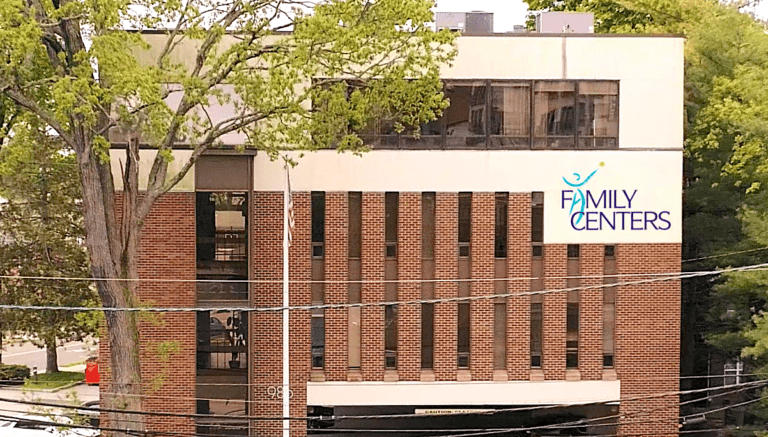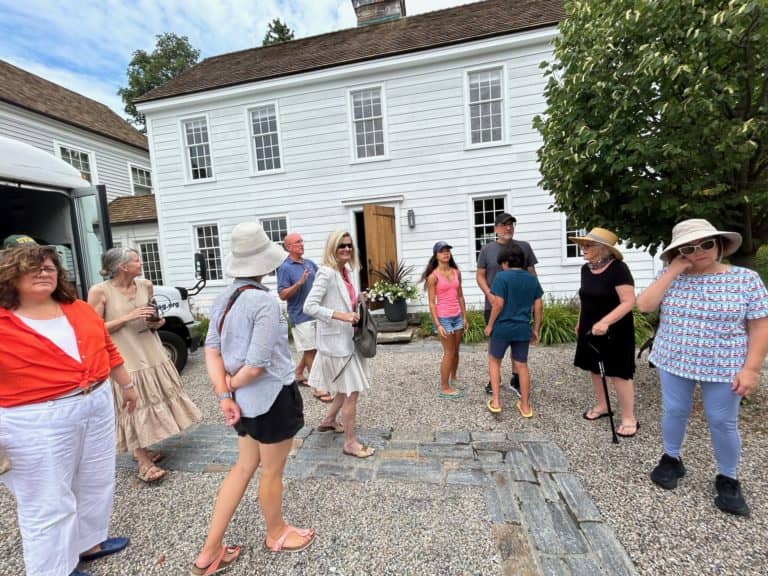Column: On my watch

By Anne W. Semmes
There was a green-empowering event held recently in backcountry Greenwich where some 50 or so individuals keen to protect our environment gathered at the Round Hill Community Church, hosted by the Rev. Ed Horstmann. And that Church is going green. “We have solarized our campus,” shared Horstmann,” “and have almost completely converted groundskeeping equipment to electric and are exploring other energy alternatives all the time.”
The attendees on March 20 were an impressive coterie of members from the Greenwich Sustainability Committee, the RTM, the Connecticut League of Conservation Voters, the Norwalk Zero Waste Coalition, the CT NOFA (Northeast Organic Farming Association), and Pollinator Pathway, plus other interested residents. All came to hear activist/lawyer Maya van Rossum, founder of the Green Amendments For the Generations initiative to secure the constitutional protection of environmental rights in states across the nation.
Based in Delaware, van Rossum’s Delaware Riverkeeper Network has led to successful efforts to halt the spread of the environmentally toxic fracking industry to the point that neighboring Pennsylvania has established constitutional rights to a healthy environment via van Rossum’s Green Amendment. Similarly signed on are New York and Montana. And, as of this March nine more states are considering such legislation.
“I have had the honor for the last 30 years plus of serving as the Delaware River Keeper,” van Rossum began her talk, “and leader of a four-state advocacy and litigation organization, the Delaware River Keeper Network that works throughout New York, New Jersey, Pennsylvania, and Delaware, fighting to protect and restore the beautiful Delaware River and every tributary stream that feeds it.”
She shared a telling story found in the second edition of her book, “The Green Amendment: The People’s Fight for a Clean, Safe, and Healthy Environment,” of Gina and her family. So, Gina “was constantly experiencing gastrointestinal issues and hair loss that left her with permanent bald spots.” Gina’s daughter had been born with an extra ear. But it was Gina’s son Kiwanis who had “endured the greater suffering” with his years of severe asthma that had finally brought his death at 24 – from the contaminated waters of a neighboring chicken processing plant, Mountaire Farms in Delaware’s southernmost Sussex County.
“When people hear stories like that,” she told, “and there are so many stories like that unfortunately across Connecticut, across the United States of America, they don’t always end with somebody losing their actual life, but they do end with people losing the quality of their lives.” How is this possible, she queried, “that that would happen here in the United States of America? Don’t we have a right to clean water and clean air, safe climate and healthy environments? Isn’t that a right by virtue of the fact that we are people here living on this earth?”
“Here in the state of Connecticut,” she continued, “You have a right to free speech and freedom of religion. You have private property rights, you have the right to bear arms, but you do not have any environmental rights. You don’t have a right to clean water and clean air and healthy environment that simply is not your right protected legally…What we have nationwide is a system of laws that presumes industries should be allowed to a permit that allows them to legally dump pollution into the water, into the air, into the soil, to decimate ecosystems, and as a result, have devastating consequences for lives across America.”
Imagine Amsterdam’s Greta Thunberg writ large on stage and you have a speaker as impassioned and determined as Maya van Rossum.
“What we have in Connecticut and nationwide,” she said, “is not a system of environmental laws that are focused on prevention of pollution, degradation, and harm. It’s a system filled with gaps and loopholes. Loopholes that are intentionally written in to allow certain industries like the fracking industry to get off the hook in many places and spaces when it comes to their impact on the environment. It’s a system filled with gaps like PFAS, that man-made family of toxic chemicals that people now are hearing so much about because it’s in the water, it’s in the air, it’s in the soils, and it is in people’s bodies having devastating consequences.” Those PFAS are “allowed to be manufactured and utilized in the ways that are allowed to slither into the environment and into people’s bodies because of a total absence of law and legislation and regulation.”
“We need a transformational change,” she said. “And I’m here to suggest to you that green amendments are the transformational change to lift up our rights to a clean, safe, and healthy environment, and places them into the Constitution in a way that gives them highest constitutional recognition and protection.” What’s needed she said was, “You have to have an environmental rights amendment that meets the definition of what I call a green amendment, and there are three states that do that, Pennsylvania, Montana, and New York.”
“You need to place the language [of that green amendment] in the Bill of Rights of the Declaration of Rights section of the Constitution…We want that same and most powerful protection for our environment.” And green amendments provide “generational protection.”
“We are going state by state,” she told, “seeking and securing the passage of a constitutional green amendment and our goal is to ultimately get one at the federal level as well so we can hold our state government officials accountable and our federal officials accountable.”
And “At this moment, the movement is advancing very powerfully…We’ve got 15 other states where green amendments are going forth, and about half a dozen other states where we’re anticipating language soon, and Connecticut is at the forefront of the movement. Connecticut has an environmental rights amendment proposal to CT NOFA that meets the definition of a green amendment.”
So, after that March 20 talk day in Greenwich Maya van Rossum was on her way to another talk at the CT NOFA’s winter conference at Eastern Connecticut State University, where she would be garnering as much support as she could find to put her Green Amendment on the table of Connecticut legislators. As of last week, reports Myra Klockenbrink, who serves on Greenwich’s Sustainability Committee, van Rossum’s Green Amendment – now translated as SJ 193, the CT Environmental Rights Amendment “was voted out of the CT Assembly’s Government Administration & Elections Committee which opens the process to get it to the Senate and ultimately onto the ballot for the people to decide.”





